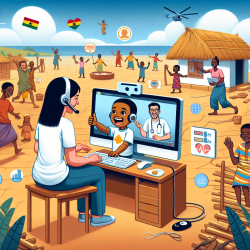Introduction
In the field of speech-language pathology, data-driven decision-making is crucial for achieving optimal outcomes for children. A recent research article titled Nepal's War on Human Rights: A Summit Higher than Everest provides insights that can be adapted to enhance our practice, particularly in online therapy services like those offered by TinyEYE.
Understanding the Context
The article highlights the severe human rights violations in Nepal during the "people's war," which significantly impacted women and children. The conflict led to social and psychological consequences, emphasizing the need for a participatory and conflict-sensitive approach to development. These insights can be translated into the realm of speech-language pathology to improve service delivery and outcomes.
Implementing Research Outcomes in Practice
Speech-language pathologists can draw parallels from the research findings to enhance their practice:
- Participatory Approach: Just as the research suggests a participatory approach to development, involving families and caregivers in the therapeutic process can lead to better outcomes for children. Engaging parents and teachers in goal setting and progress monitoring can create a supportive environment that reinforces therapy goals.
- Conflict-Sensitive Development: In speech-language pathology, this translates to being sensitive to the unique challenges each child faces. Understanding the child's home environment, cultural background, and any socio-economic challenges can help tailor therapy to meet individual needs effectively.
- Broad Social Policies: The article emphasizes the need for broad social policies to address health inequities. Similarly, advocating for policies that support access to speech-language services, especially in underserved areas, can help bridge the gap in service delivery.
Encouraging Further Research
The article underscores the importance of ongoing research and international collaboration to address human rights violations. Speech-language pathologists should be encouraged to engage in research to explore innovative methods and technologies that can enhance therapy outcomes. Collaboration with international experts can provide new perspectives and solutions to common challenges in the field.
Conclusion
By implementing the outcomes of this research, speech-language pathologists can improve their practice and contribute to better outcomes for children. A focus on participatory approaches, conflict-sensitive development, and advocacy for supportive policies can make a significant difference. To read the original research paper, please follow this link: Nepal's War on Human Rights: A summit higher than Everest.










